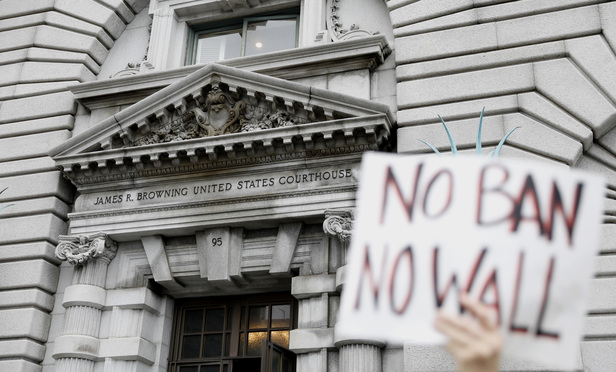A Justice Department spokeswoman said the government will appeal the ruling to the Supreme Court.
“The Supreme Court has stepped in to correct these lower courts before, and we will now return to the Supreme Court to vindicate the executive branch’s duty to protect the nation,” she said in an email.
The decision said the court will enter its mandate solidifying the decision in five days, instead of the typical 52, due to the dire situation facing most refugees.
“Refugees’ lives remain in vulnerable limbo during the pendency of the Supreme Court’s stay,” the decision said. “Refugees have only a narrow window of time to complete their travel, as certain security and medical checks expire and must then be reinitiated. Even short delays may prolong a refugee’s admittance.”
The judges, Ronald Gould, Richard Paez and Michael Daly Hawkins, are the same three who ruled in June that Trump did not have the authority to issue the travel ban order in the first place.
Hawaii was represented by a team of lawyers from Hogan Lovells, led by partner Neal Katyal and argued by associate Colleen Roh Sinzdak. Hashim M. Mooppan represented the government.
The government had argued certain provisions in the Immigration and Nationality Act indicated that in the immigration context, a “close-familial relationship” only applied to parents and parents-in-law, spouses, children, siblings, engaged couples and step-relatives. The decision, however, said there was “no support for the proposition” that the Supreme Court’s order was informed by the INA, and that even so, the government “cherry-picked” provisions from the INA to fit its argument.
“The government’s decision to rely on the cited specific provisions of the INA is troubling because other provisions of the INA (and other immigration laws) offer broader definitions,” the court wrote.
With respect to refugees, the government contended that “formal assurances” could not constitute a “bona fide relationship” with the United States because the assurances are agreements between the State Department and refugee resettlement agencies. The high court said a “bona fide relationship” is one that is “formal, documented, and formed in the ordinary course rather than to evade the executive order.”
The decision noted the various security screenings and legal hurdles refugees must clear before a formal assurance can be issued, and the money and effort resettlement agencies expend to serve refugees.
“This advance preparation and expenditure of resources supports the district court’s determination that a bona fide relationship with the refugee exists,” the decision said.
Though the Supreme Court will hear oral arguments on the general legality of the travel ban in October, Thursday’s Ninth Circuit decision is the result of an appeal by the state of Hawaii. The state asked U.S. District Judge Derrick Watson of the District of Hawaii to clarify the Supreme Court’s order.
He declined at first, on the grounds that he didn’t have the authority to clarify a Supreme Court order. Later, when the challenge was posed differently, Watson agreed and expanded the exemption to include grandparents, grandchildren, cousins, nieces and nephews, aunts and uncles and brothers- and sisters-in-law.





